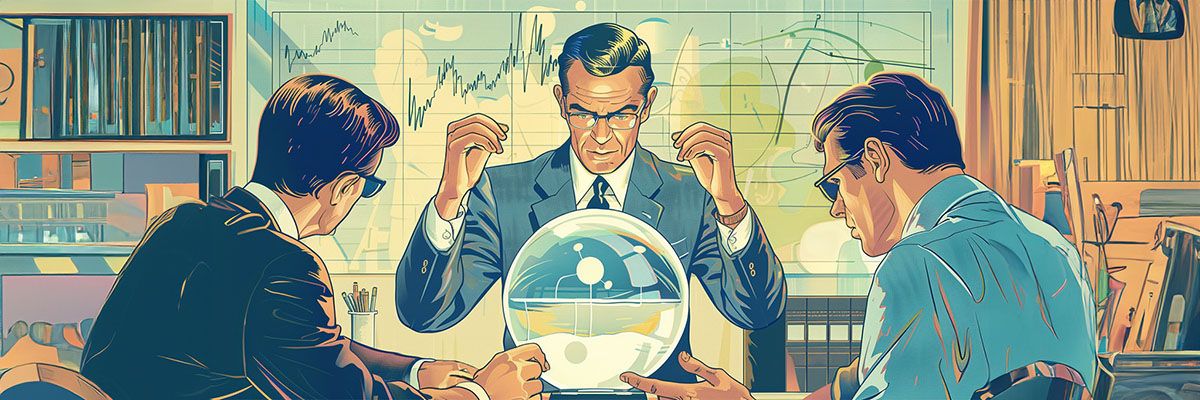You would have had to be living under a rock to have missed it, but the impact of the cloud on retail has been nothing short of revolutionary. Cloud-based e-commerce platforms are ubiquitous in providing retailers with scalable, customizable online storefronts, enabling them to showcase products, manage inventory, process transactions securely, and deliver seamless shopping experiences to customers across web and mobile channels.
Just as significant, if slightly less obvious, is the role of the cloud in facilitating POS systems that enable retailers to process transactions, manage sales data, and track inventory from any internet-connected device. As with e-commerce in general, cloud services provide the flexibility, mobility, and scalability than enable POS systems to be simultaneously reliable, responsive and cost-effective.
[Image: isometric flat design diagram of connections between shops, factories, customers, transport, money, laptops, smartphones]
Specific applications
However, beyond these general advantages that the cloud brings to retail, there is a rapidly increasing range of applications that either owe their existence to the cloud or have been made a realistic proposition to ordinary businesses. All of these innovations capitalise on two key features of the cloud:
- The ability to connect almost anything from anywhere.
- The capacity to process lots of data at affordable rates.
Once you add these two together, a lot of very useful tools start to emerge. An almost universal truth of retail is that businesses tend to have lots of things (assets, infrastructure and people) in lots of different places, and lots of data about these things that is already in the system. Let’s have a look at some examples of how these resources can be turned into assets, and how business challenges can be turned into competitive advantages.
1. Demand Forecasting Solutions

One of the basic skills for success in business is in being able to predict demand accurately, but prediction models are only as good as the accuracy and timeliness of their input. The great strength of cloud-based demand forecasting systems is that they can process lots of data at affordable rates and, uniquely, they can draw on accurate, real-time data from multiple, distributed locations. Once the information is into the system, these tools can then use advanced algorithms to analyse various aspects of retail activity, including:
- Historical sales data,
- Market trends,
- Various external factors.
This analysis helps retailers accurately predict future demand, adapt strategy accordingly and take concrete steps to avoid problems before they happen.
2. Inventory Management Systems

Likewise, while Inventory Management Systems are nothing new by themselves, the arrival of the cloud is undoubtedly taking them to another level. Cloud-based inventory management systems now allow retailers to:
- Track stock levels in real-time.
- Streamline procurement and replenishment processes.
- Optimise warehouse operations.
- Prevent stockouts or overstocking,
- Inventory accuracy and cost savings
These improvements offer several benefits for retailers. By using real-time tracking, retailers can better monitor stock levels, reducing errors and saving money, and the general streamlining of processes helps maintain optimal inventory levels, avoiding unnecessary costs elsewhere. Overall, these changes significantly improve inventory accuracy and lead to significant cost savings for retailers and, whilst it’s too early to provide robust data to quantify the improvements, the early results are extremely encouraging.
3. Dynamic Pricing Tools

In a similar way, cloud-based dynamic pricing tools analyse market conditions, competitor pricing, and customer behaviour to adjust prices in real-time. Retailers can optimize pricing strategies based on demand fluctuations, competitor activities, and other factors, maximizing revenue and profitability.
Not only this, but the key role of the cloud also ensures that these prices can be applied to any retail venue, at any location and at any time. This has the clear potential to make a big difference in markets with dynamic consumer preferences, seasonal demand patterns, and intense competition, such as the retail sectors of fashion apparel, electronics, or online marketplaces.
4. Omnichannel Retail Platforms

Towards the customer-facing side, the ability of the cloud to provide real-time updates is also instrumental in delivering several other ground-breaking technologies.
Cloud-based omnichannel platforms, for example, integrate online and offline sales channels, providing a unified shopping experience for customers across multiple touchpoints. Seamless inventory management also means better information for the customer, along with improved order fulfilment, and customer service is improved in a way that boosts convenience and satisfaction.
5. Spice up your marketing
Aside from logistics and all-round improvements to your products and services, cloud technology can also help your all marketing efforts in less tangible ways including (but not only):
- Customer Loyalty Programs: With cloud-based platforms, you can easily create and manage customer loyalty programs. By using real-time data and insights, you can personalize rewards and incentives, fostering stronger customer relationships and boosting brand loyalty with the help of platforms like Salesforce or HubSpot.
- Personalized Marketing: The cloud enables you to deliver targeted marketing campaigns at scale. By centralizing customer data and using advanced analytics, you can tailor your messaging across different channels with cloud-based marketing automation tools such as Mailchimp or Marketo to facilitate this personalized approach.
Beyond these two examples, the cloud touches almost every aspect of your marketing and sales activities and, by incorporating cloud technology into your approach, you can deliver more tailored experiences to your customers, driving engagement and loyalty.
Embracing the cloud revolution in retail
So, there you have it! The cloud isn't just transforming retail; it's revolutionizing the way businesses operate and connect with customers. With innovative solutions like forecasting demand, managing inventory, adjusting pricing dynamically, and creating boundary-free shopping experiences across channels, the potential for growth and efficiency is almost without limit. By embracing cloud technology, retailers can streamline processes, personalize interactions, and stay ahead in today's competitive market landscape.
Further Reading
- Designing for better DCX in retail with AWS Lambda [Case Study]
Ready to take your retail business to new heights with the cloud?
Our certified experts are here to guide you every step of the way. Whether you're looking to optimize inventory management, implement dynamic pricing strategies, or create smooth omnichannel experiences, we have the expertise to help you unlock the full potential of the cloud. Get in touch with us today and let's embark on your journey together!
